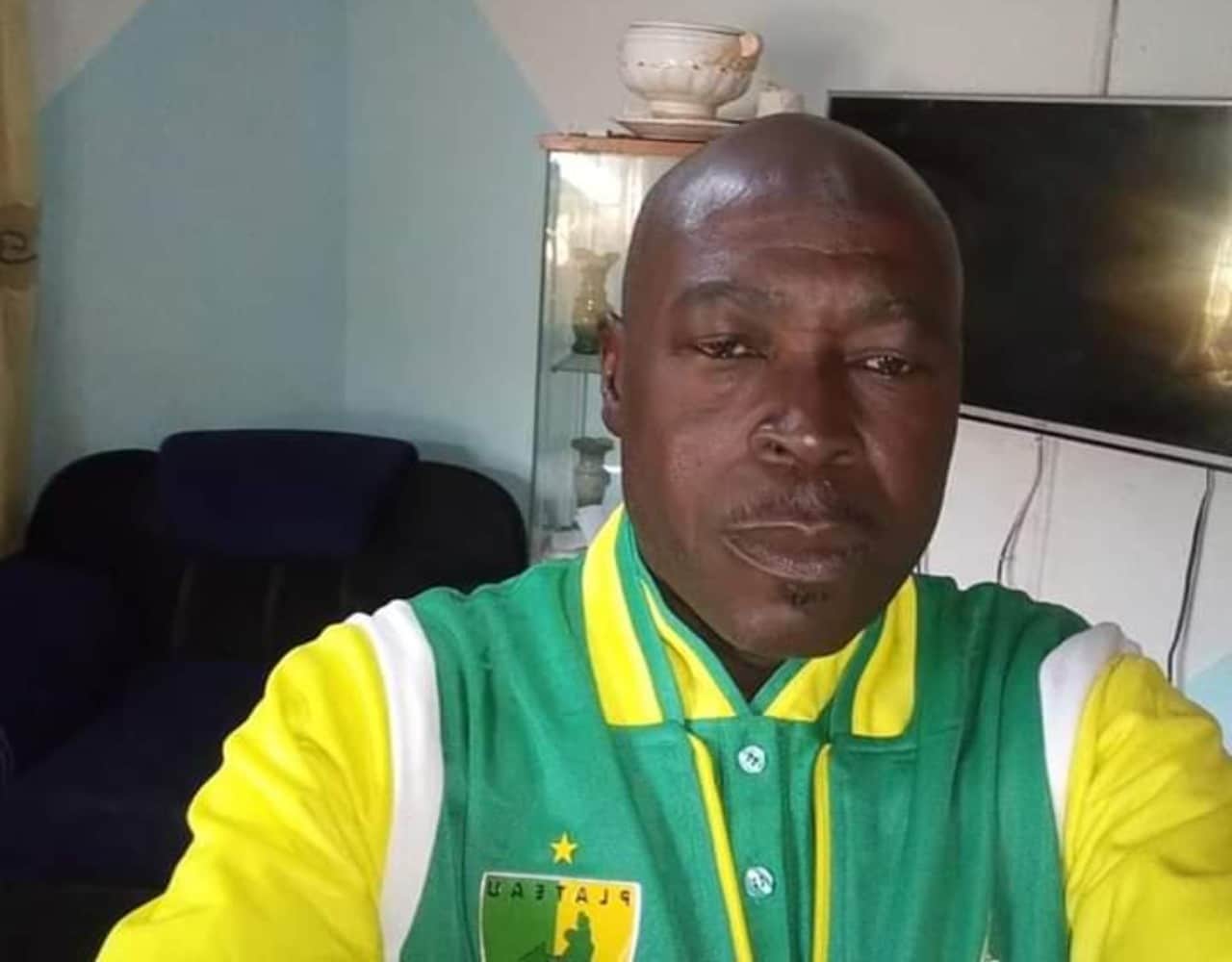Tag: Training
-
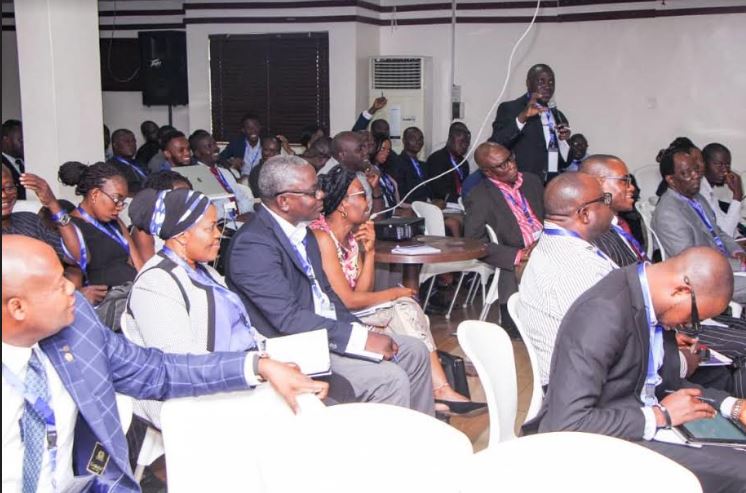
Photos: Brokers Undergo Training on AML/CFT Training
In compliance with the requirement of the National Insurance Commission, the regulatory body of the insurance industry, members of the Lagos Area Committee (LAC) of the Nigerian Council of Registered Insurance Brokers (NCRIB), underwent a training on Anti-Money Laundering and Combating Financing of Terrorists (AML/CFT) at the Insurance Brokers House in Yaba, Lagos, last Thursday.
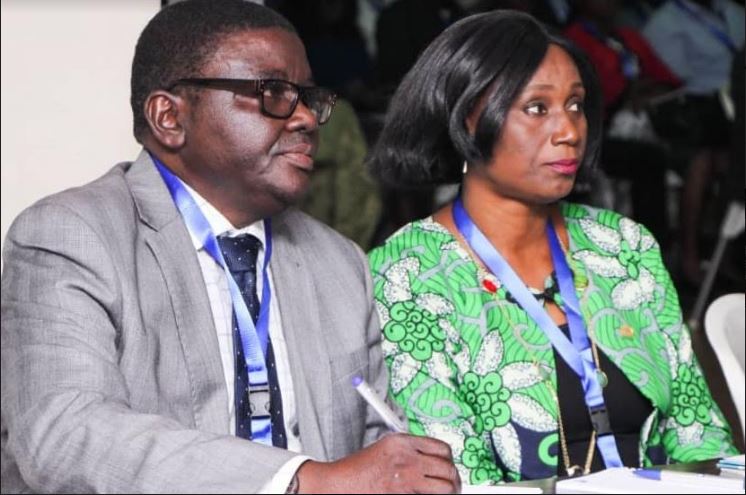
The training is essentially to ensure that brokers are consciously or unconsciously not used to launder illicit money not used as conduit pipes to finance terrorism.
Welcoming participants to the training, the Lagos Area Committee Chairman, Mrs. Bukola Ifemade, explained that the training is in compliance with the requirements of the National Insurance Commission (NAICOM). “By regulatory requirements, it is very important for us to attend at least one training in a year like this one which is organised in partnership with AXA Mansard,” she said, adding that, “It is the wish of the executive members of the Lagos Area Council of NCRIB to see every broker do well and free from sanctions as a result of infractions. I welcome each of us to this training I wish us the best and a very nice day.”
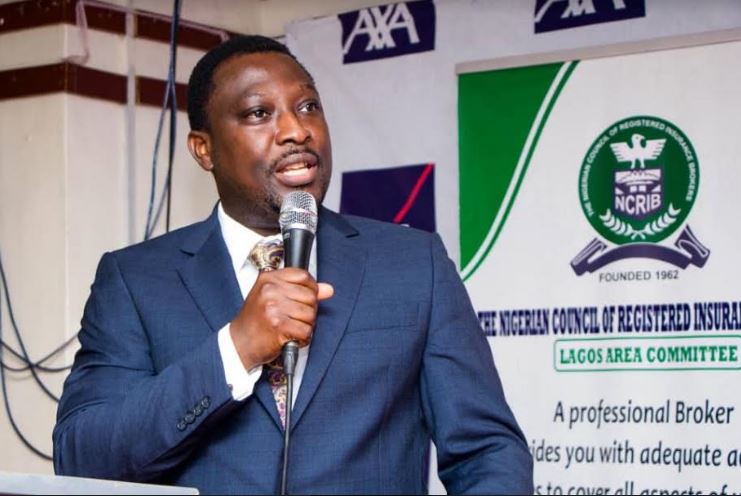
The full-day training was facilitated by LeishTon Centre for Leadership and Governance Thinking and fully attended by members of the LAC. McLeish Otuedon, Director, LeishTon Centre for Leadership and Governance Thinking, led the highly engaging and interactive training.
Brokers were provided leading practice insights into the world of AML/CFT as well as the legal and regulatory frameworks guiding it, money laundering offences, predicate offences and sanctions, risk-based approach to effective to effective AML/CFT among others.
In a chat with the media, Ifemade while further giving rationale behind the training said that every year, practitioners in the industry, particularly brokers, being the professional marketing arm are mandated to have these trainings at least once in a year, with certificates.
Trainings are to be provided by certified personnel or organisation on anti-money laundering. She added that it is also in line with meeting the requirements of the Inter-Governmental Action Group Against Money Laundering in West Africa (GIABA). “Particularly at this time, asides meeting the regulatory requirements, there is going to be an international body, GIABA, coming into the country to measure or assess the anti-money laundry exercise in Nigeria. You know Nigeria has been facing this corruption issues and one of the ways of checkmating this is through anti-laundering efforts like this. GIABA officials are coming in October to do an assessment of the country. An
assessment of the country means, they are going to assess the financial operators of which insurance brokers are one.”
She further stressed that the training is done in partnership with corporate organisations to ease costs members would have incurred going for such on their own. Many of our members do not have the financial capacities to meet up with many of these regulatory requirements. To attend this training on their own is going to dig a huge hole in their pockets. These people already have their own regular expenses they expend in running their regular day to day operations. They have a lot of subscriptions to be paid to regulators and government, etc.
“What we do at Lagos Area Committee is to find ways for our members to manage their financials. So, rather pay money from their pockets, we try to find partners who will collaborate with us, and do it for us for free. All we need to do is make ourselves available and take advantage of this because that is the only way we can encourage our members as we believe very strongly that our councils can only be as strong as our members.
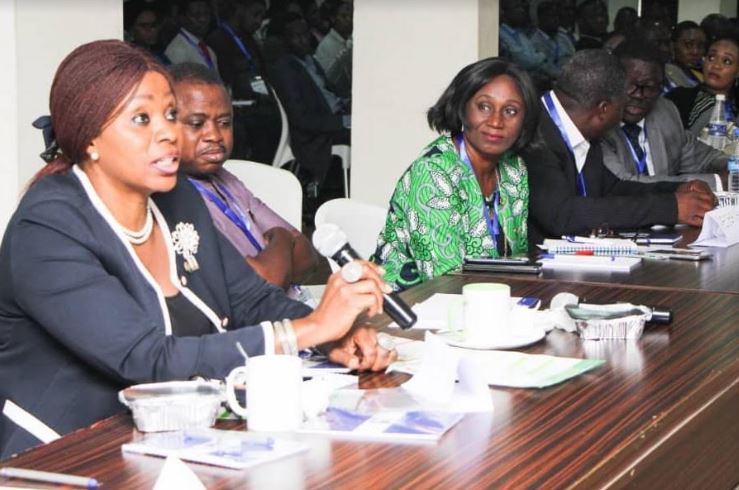
“That is where companies like AXA Mansard come in. You see, they are one of those companies that recognise the importance of insurance brokers in Nigeria and the critical roles we play. Knowing that if they are able to empower and help brokers, it will grow the insurance market. Growing the insurance market means that insurance companies are growing. Not many insurance companies have bought into that, but those that are visionaries know that if you grow the brokers, you are growing the industry and effectively the industries themselves,” she concluded.
-

Google kicks off certification training for digital marketers
Google kicked off its certification training programme for digital marketing agencies based in West Africa on Thursday in Lagos.
TheNewsGuru (TNG) reports Google kicked off the programme with up to 400 marketers in Lagos with subsequent Google certification training sessions for digital marketers scheduled in Accra, Ghana on July 18, as well as in Abuja, Nigeria at a date soon to be confirmed.
Google Partners Lead, Nigeria, Tolulope Akinyele, at the training on Thursday in Lagos, said “The participants ranged from digital planners, strategists and account managers, and each was equipped with the tools needed to develop their expertise and capabilities on the Google Ads Platform.
“Subsequent Google certification training sessions for digital marketers are scheduled in Accra, Ghana on July 18, as well as in Abuja, Nigeria at a date soon to be confirmed.
“The boot camp for digital marketers aims to equip participants with the fundamentals of performance and brand marketing, using the Google Ads platform to drive better performance and results for their clients’ portfolios.
“Topics covered include: Shaping a Search Strategy for Your Advertiser: Mobile”, “Measurement principles; Shaping a Video Strategy for Your Advertiser: Video Formats; and Shaping a Search Strategy for Your Advertiser: Creative Excellence, among others.
Akinyele added that with the worldwide digital ad spend predicted to reach more than 375 billion dollars by 2021, digital marketers were positioned at the core of any business that needs to stand out from the clutter in a fast-moving digital world.
She said that digital marketers needed to be equipped to develop cutting-edge strategies to take their client’s businesses to the next level in this post-digital era.
“Eligible agencies will receive Google Ads certification, as well as access to our agency growth programmes,” Akinyele said in a statement.
She noted that in addition to training on the Google Ads solution and platform, digital marketers and agencies would obtain Google certification and access to the Google agency community.
Akinyele said that for agencies, certification means they could demonstrate that Google recognises them as experts.
“The training part-qualifies them to become Google partner agencies and earn the Google partner badge,’’ the Google Partners Lead said.
She urged interested agencies which were unable to attend the programme to go through the certification process online. -

Why digital skills training is so important
In 2018, numbers on Internet usage made headlines announcing that more than half the world is online.
This is indeed great progress given that 15 years earlier (in 2003) only 12% of the world’s people were using the Internet.
Despite this enormous growth, however, nearly half of the world’s people are still not using the Internet and so unable to reap many of the benefits of today’s digital economy. Even worse, Internet user growth rates in developing countries are slowing.
So what can be done to get everyone online and be part of the digital society and economy?
According to Susan Teltscher, Head of ITU’s Human Capacity Building Division, “providing digital skills training – along with lower costs and more relevant content – are some of the key factors to bridging the digital divide, but first it is important to have a clear idea of the reasons why more people are not using the Internet”.
Why are people not using the Internet?
It is often wrongly assumed that people are not online because they don’t have access to Internet services (e.g. no Internet where they live). The facts do not support this argument.
Today, more than 90% of the world population live within reach of a 3G (if not 4G) mobile broadband network. So in theory, people could buy a data package from a local operator and go online.
One could argue that global Internet usage could stand at 90% (instead of 50%) if everyone who had access to the service bought it. But we know that this is not the case. We need to look for, and understand, other barriers or reasons for why people choose not to use the Internet so that appropriate action can be taken.
Affordability is certainly a major reason. Although smart phone prices have dropped across the globe, they are still high – as much as people’s monthly income in a number of countries. Data packages are also costly and the quality of the connection is often low which doesn’t incentivize people to buy the service.
This, coupled with the lack of attractive applications with relevant content is reason enough not to spend the little money available. The mobile revolution took off since it addressed a basic need of people – to be able to communicate. Even poor households spend a large share of their income on mobile telephony (sometimes more than on food) since they value it highly.
Unless such basic needs will be met by Internet-enabled services, the Internet revolution will not take off in poor countries.
Lack of education and skills is a key barrier to Internet uptake
One of the main barriers to Internet uptake is a lack of capacity and skills of people to use the Internet and take advantage of what it offers.
Data collected in developing countries through national representative household surveys and compiled by ITU, as well as through the After Access surveys, provide revealing insights in this regard: when asking people why they are not using the Internet, around 65% of the answers are linked to education and skills (e.g. “don’t know what the Internet is”, “don’t know how to use it”).
Even in more advanced countries, 60% of the population lack standard digital skills. There is a strong correlation between people’s levels of education and Internet usage.
The gap between people having access to Internet and not using it is largest in the least developed countries (70% 3G service coverage compared with 20% Internet usage in 2018).
In these countries, the gender Internet user gap is also the largest and it is often girls and women who are also less educated and digitally illiterate.
What needs to be done?
Therefore, the policy focus has to shift from a discussion on infrastructure/access-related measures towards digital literacy and human skills development measures in order to effectively close the digital divide and ensure that all citizens will be part of the evolving digital society.
This will require a concerted effort by all stakeholders involved in the digital skills ecosystem, ranging from policy makers across different sectors to private companies, academic and educational institutions, as well as community-based organizations.
This is now increasingly being recognized by national governments and the international development community. Programmes and initiatives addressing the digital skills gap are mushrooming.
Digital skills are needed at all levels: at the basic level, to help people connect and benefit from Internet services and applications; at the intermediate level, to help students and job seekers get the necessary skills required by the digital economy; and at the advanced level to increase the pool of ICT experts and meet the demands of the industry.
-
Killings: Police to retrain officers, men on arms handling
In a bid to stem the tide of police brutalities against the civil population, the police authorities have concluded plan to return all officers and men to the range from retraining on arms handling and proficiency.
The Assistant-Inspector General of Police for Zone 11, Adeleye Oyebade, who made the disclosure at the inauguration of the “Operation Puff Adder” at the Zonal Headquarters along Gbongan-Ibadan road in Osogbo, Osun State capital, said the police could not allow the little mistakes and errors continue to affect the achievements of the Force.
The Police Commissioners for Osun, Oyo and Ondo States comprising the Zone 11 Police Command, Mrs. Abiodun Ige, Mr. Sina Olukolu and Mr. Undie Adie, were present at the inauguration.
He said the Inspector-General of Police, Mohammed Adamu, in compliance with President Muhammadu Buhari’s directive have rejigged “our security architecture by launching “a new operational outfit code named ‘Operation Puff Adder.”
According to him, the new outfit, since its inauguration, has begun to yield positive results, adding that the IGP has directed that the outfit be replicated in all the zonal and state commands to complement existing security structures.
Oyebade, who said the police has the resources to prosecute the operation, assured that the Force has upgraded its technical platform to fight crimes, including kidnapping, armed robbery, cultism among others.
He said the new face of the Nigeria Police is proactive and will not allow crimes to overwhelm its officers and men.
Disclosing that the police has identified flash point and was battle ready to curtail criminal activities across the nation, he maintained that the police is strategic in its planning and operations.
He further disclosed that the police is sharing information with sister security outfits including the Nigeria Army, Department of State Security Service, the Nigeria Security and Civil Defence Corps, the Nigeria Prisons Service, the Nigeria Immigration Service among others to combat crimes.
He said the Zone 11 Police Command will soon hold a security stakeholders’ conference, where the Civil Society Organizations, Labour and Industrial Unions, Non-Governmental Organizations will be in attendance.
The police boss, therefore, called for patience and understanding of members of the public, advising them to always reach out to the police via the control rooms whenever they are in distress.
He assured that the police will respond promptly whenever called upon by members of the public.
-
Terrorism: Nigeria to send Military to Brazil for training
The Federal Government has called for the support of Brazilian Government in the fight against Boko Haram terrorism and piracy in the Gulf of Guinea.
Minister of Defence, Mansur Dan-Ali, made the call in Rio de Janeiro, when he visited his Brazilian counterpart, Mr Fernando Silva.
In a statement in Abuja on Friday, Media Assistant to the minister, Col. Tukur Gusau, quoted him as saying that terrorism was a global phenomenon that needed to be addressed by all nations.
Dan-Ali also requested the assistance of the Brazilian Defence Ministry to Nigeria’s effort at establishing a military industrial complex in the country.
He added that “very soon, Nigeria will be sending its military officers to Brazil for training”.
In his response, E-Silva pledged the support of his country to Nigeria for the combat of insurgency and terrorism.
-
Boko Haram: 190 policemen abscond from counter-insurgency training
…as IGP orders arrest. prosecution of fleeing officers
The Force Headquarters has ordered the arrest and prosecution of 190 riot policemen who absconded from the ongoing training at the Special Forces School, Buni-Yadi, Yobe State.
The fleeing policemen were part of the 2,000 Police Mobile Officers mobilised for the training preparatory to their deployment for combat against Boko Haram insurgents in the North-East.
They were deployed by the Inspector-General of Police, Ibrahim Idris, about three weeks ago for purely military duties under the ‘Operation Lafiya Dole.’
The Police authorities had argued that the deployment of the men was consistent with Section 4 of the Police Act and Regulations, which allows them to perform such military duties both within and outside Nigeria as may be required of them.
The 190 missing cops were believed to have bailed out of the SFS because they did not want to participate in the counter-insurgency operations.
Findings indicate that the policemen were drawn from MOPOLs 2, Keffi; 3 Enugu; 5 Benin; 8 Jos; 11 Calabar; and 16 Abeokuta.
Others were from MOPOLs 17 Akure; 18 Owerri; 19 Port Harcourt; 20/22 Ikeja; 23 Keffi Str.; 26 Uyo; 28 Umuahia; 30 Yenagoa; 31 Asaba; 32 Abakaliki; 35 Dutse; 39 Ogbomoso; 43 Lion Building; 50 Kubwa; 51 Oghara; 54 Onitsha and 56 Ogoni.
A Police wireless message with reference DTO:241610/12/2018 sighted by our correspondent on Wednesday, and signed by the Commissioner of Police in charge of MOPOL, directed that the errant operatives should be arrested and produced under escort.
Checks showed that over 120 of the absconding officers were Sergeants, while the rest included some Inspectors and a few Corporals.
The Force Public Relations Officer, Acting DCP, Jimoh Moshood, could not be reached for comment on the development as he did not respond to calls and text message.
The spokesman had disclosed that the Nigeria Police Force had on ground 47 PMF units in Borno, 26 units in Yobe and 18 units in Adamawa, in addition to the regular PMF Squadrons in the three states.
-
JUST IN: FG approves seven years training tenure for resident doctors
The Minister of Labour and Employment, Chris Ngige, on Wednesday, said the Federal Government has decided to approve seven years tenure doctors’ resident training.
Ngige said this while briefing State House correspondents of the outcome of the weekly meeting of the Federal Executive Council at the Presidential Villa, Abuja.
“Government has fixed a tenure for doctors’ resident training at seven years. It is not a permanent job,” the minister said.
He explained that the decision was taken based on the report of a technical committee presented to the government.
As part of the recommendations in the report, Ngige said the government was also demanding that there should be tenure of a maximum of two terms for executives of trade unions.
Details later…
